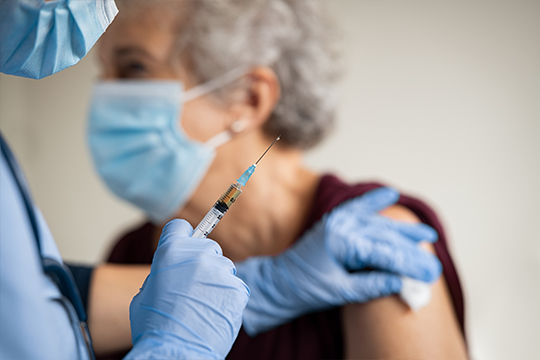
Vaccine rollout varies from province to province, but the federal government has stated it expects all Canadians to be vaccinated by September 2021.
Federal Retirees has heard from members with questions and concerns about when older adults will receive COVID-19 vaccines.
The answer still isn’t easy or clear, and it’s evolving on an almost-daily basis in some parts of Canada.
Vaccine strategies vary from province to province and territory to territory, and the situation with vaccine supply, including the approval of new vaccines, is changing often.
COVID-19 immunization plans by province/territory
Canada’s vaccine strategy
In Canada’s COVID-19 Immunization Plan: Saving Lives and Livelihoods, the federal government’s goal is to “enable as many Canadians as possible to be immunized as quickly as possible, while ensuring high-risk populations are prioritized,” all to reduce the risk of severe illness and death for the most vulnerable populations.
The National Advisory Committee on Immunization (NACI) is an advisory body to the Public Health Agency of Canada. Experts from various fields including, but not limited to, infectious disease, immunology and public health provide recommendations for the use of vaccines that are currently or newly approved for use in Canada. This includes identifying groups at risk for vaccine-preventable diseases and guidance on vaccination allocation.
In February 2021, NACI updated its recommendations to help guide provinces and territories in prioritizing key populations for COVID-19 immunization. This was an update to earlier guidance shared in December 2020.
Key population groups for the COVID-19 vaccine(s) are organized into three stages, in consideration of the vaccine supply expected in each quarter of 2021.
Stage 1 prioritizes groups who are at higher risk of severe outcomes of COVID-19 and those most likely to transmit to those who are at higher risk, including:
- Residents and staff of shared living settings who provide care for older adults.
- Adults 70 years of age and older, with order or priority:
- Beginning with adults 80 years of age and older.
- Decreasing the age limit by 5-year increments to age 70 as supply becomes available.
- Front-line care workers who have direct contact with patients, including:
- Personal support workers.
- Those who work in health-care settings.
- Adults in Indigenous communities.
It is recommended that, as the vaccine supply increases, efforts should be made to offer the vaccine to individuals in the key populations identified before moving to the next stage.
There are several factors that NACI reviewed to develop its recommendations.
The population-based analysis looked at the risk of exposure, risk of severe illness and death from COVID-19, the safety and efficacy of authorized vaccines for key populations, results of clinical trials, and vaccine supply.
NACI also looked at biological risk factors, like advanced age and pre-existing medical conditions, and social factors, like low economic status and belonging to a racialized population.
The recommendations also aim to minimize social disruption by prioritizing those who provide essential services and take risks in their role to protect the public.
NACI also included a review of ethics, equity, feasibility and acceptability in its decision-making process.
Provinces are rolling it out
The provinces and territories are in the midst of an unprecedented vaccine rollout. These programs have taken into account expert advice, federal guidelines, vaccine supply and its administration requirements, vaccine storage and delivery as well as provincial/territorial populations and logistics. Provinces are encouraged to align with NACI’s recommendations as much as possible while considering local situations. None of Canada’s provinces or territories are created equal, and the strategies are evolving, complex and very localized.
Most provinces and territories are using a phased approach to receive, store and administer COVID-19 vaccines. Older adults, beginning with those 80 and older, are generally included in phases 1 and 2 depending on the province/territory, despite being a high-risk population.
And while supply is an issue, reporting shows many provinces are on track to meet the vaccination targets. The federal government has stated it expects all Canadians to be vaccinated by September 2021.
Residents are encouraged to monitor the vaccine rollout in their local area for information about when and how to receive a vaccine. The best source of information on when you will have access to a COVID-19 vaccine is your local health unit, agency or department.
Don’t let down your guard
Even with the vaccine, it remains very important that we all continue to follow recommended public health measures including physical distancing, wearing a mask, frequent hand-washing and staying home when sick.
This pandemic has had a disproportionate impact on Canada’s older adult population. The tragedy that has unfolded in long-term care and in our communities, and the fear and insecurity older Canadians and at-risk populations have been living with as a result of the virus are tiresome and dangerous.
We know older Canadians are more vulnerable to COVID-19 and should be prioritized for the COVID-19 vaccine as the NACI guidelines recommend. Federal Retirees expects the federal, provincial and territorial governments to work together to immunize older adults as quickly as possible – while understanding that vaccine supply and rollout are complex public programs that will sometimes be impacted by factors beyond control.
Federal Retirees will continue to monitor the vaccine rollout across the country, with a focus on ensuring provinces and territories align with NACI guidance.
COVID-19 immunization plans by province/territory
British Columbia: www2.gov.bc.ca/gov/content/safety/emergency-preparedness-response-recovery/covid-19-provincial-support/vaccines
Alberta: www.alberta.ca/covid19-vaccine.aspx
Saskatchewan: www.saskatchewan.ca/COVID19-vaccine
Manitoba: www.gov.mb.ca/covid19/vaccine/index.html
Ontario: covid-19.ontario.ca/covid-19-vaccines-ontario
Québec: www.quebec.ca/en/health/advice-and-prevention/vaccination/covid-19-vaccine/
New Brunswick: www2.gnb.ca/content/gnb/en/corporate/promo/covid-19/vaccine.html
Nova Scotia: novascotia.ca/coronavirus/vaccine/
Prince Edward Island: www.princeedwardisland.ca/en/information/health-and-wellness/covid-19-vaccines-and-immunization-phased-approach
Newfoundland and Labrador: www.gov.nl.ca/covid-19/vaccine/
Yukon: yukon.ca/en/covid-19-vaccine
Northwest Territories: www.gov.nt.ca/covid-19/
Nunavut: www.gov.nu.ca/health/information/covid-19-vaccination

